The American Dream is still alive. But English may no longer be its first language.
Just ask Dr. Farzaneh Razzaghi, dean of library services at WCU’s Hunter Library.

Dean of library services Dr. Farzaneh Razzaghi is responsible for the oversight of Hunter Library, which serves over 10,000 WCU students. Photo by Caleb Peek.
“If there is one thing that people like me truly value, and there are hundreds of things, but if there is one thing that is valued the most, it’s democracy,” she said.
As the ongoing legal battle continues over president Donald Trump’s halt on immigration from seven Muslim-majority nations, the concept of democracy has become cloudy for Razzaghi and millions like her.
Razzaghi is as American as apple pie and commercialism. An immigrant from Iran, she first came to the U.S. in 1976 to become a student in what she still views as “the best higher education system in the world.” As Razzaghi settled into her new country, she quickly realized an aspect of freedom that’s widely taken for granted.
“A few days after I arrived was the debate between (then) President Ford and President Carter, and that was the first time that I saw a debate by politicians,” she said with a smile. “I had never seen anything like this before, and I thought it was wonderful. I thought, ‘this is called democracy’.”
Razzaghi would graduate from Texas Woman’s University in Denton, Texas. But while she was in school gaining an education, a brutal war started between her homeland and neighboring Iraq.
The young Iranian, who had intended to return home after two to three years in the States, found herself and her two daughters stuck in the land of opportunity.
“We decided to stay and wait for the war to end,” said Razzaghi. “Unfortunately, the war dragged on for about 10 years.” She wouldn’t return to Iran for 18 more.
A naturalized American citizen for decades, Razzaghi has served as library dean at Western for nearly two years. Razzaghi is the captain of a monolithic vessel inside her second-floor corner office, where she has the final say on all library undertakings, from new technology and literature to employee relations. Razzaghi also serves as the liaison between library and provost, where she goes to make presentations for funding increases.
Margaret Watson, budget manager at Hunter Library, works directly across the foyer from Razzaghi’s office. Watson, a library employee since 2007 who often serves as Razzaghi’s first mate, says that she’s a demanding boss, but an intelligent business mind that always makes decisions with a “bigger picture” outlook.
“I’d love to just walk around this library and show you the improvements that Dr. Razzaghi has made, and she’s done that by being very frugal with the library’s money,” Watson said. “She doesn’t go to the provost and ask for money unless that money is absolutely needed.”

Protests against the Trump administration’s ban on immigration from seven Middle Eastern nations have sprang up around the country. Photo courtesy of NBC News.
But as a Trump executive order that suspends immigration from seven Middle Eastern countries, Iran included, for 90 days and bans Syrian nationals from entry for four months is challenged in court, lines of division have become deeply entrenched throughout the U.S. And suspense is only building as the 9th Circuit Court in Seattle prepares to issue a verdict.
“Republicans from around the state of North Carolina are very disappointed with the courts overturning the will of the people,” said Isaac Herrin, WCU student and North Carolina Republican Party affiliate. “The ban is necessary to keep our country safe, plain and simple.”
Razzaghi agrees to respectfully disagree. She’s a proponent of secured borders, citing her understanding that safety at home sometimes means keeping certain groups out. But Razzaghi also says that the vast majority of immigrants affected by the ban are not terrorists.
“My mom is a U.S. citizen, but she lives in Iran now,” Razzaghi said. “She’s 90 years old. And she needs the healthcare here, because she can’t afford it where she is. So she used to travel by herself, come live with us for three or four months and then go back.”
“When I was watching and listening to this news, I was thinking ‘Oh, my God, what if this was my mom?’ She’s had heart surgery and heart problems, and she definitely would have had a heart attack. These are things that immigration opponents need to listen to and say, ’You know what? They may be right.’”
Judges have heard arguments from attorneys representing both sides of the ban. A decision to uphold or strike down the order is expected by mid-February.



